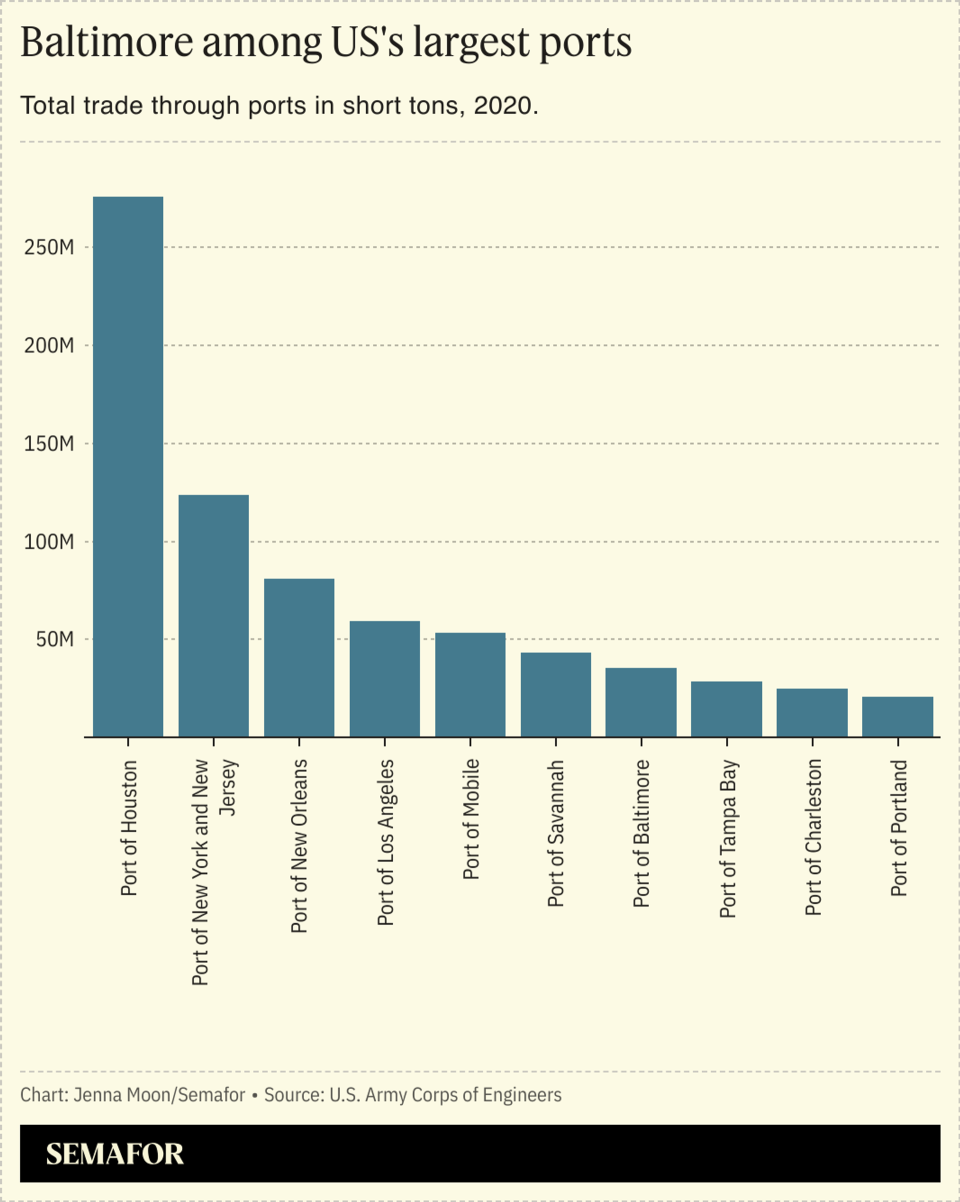Trade disruptions feared after Baltimore bridge collapse
- Oops!Something went wrong.Please try again later.
Semafor Signals
Supported by
Insights from Bloomberg, The Independent, and StateScoop
The News
A major bridge in the U.S. city of Baltimore collapsed on Tuesday after it was struck by a large container ship, sending vehicles into the Patapsco River below.
Rescuers are searching for at least six people in the water and authorities have declared a state of emergency.
The Francis Scott Key Bridge stretches over 1.6 miles and carries a portion of the Interstate 695 highway. The Dali container ship that struck Key Bridge was chartered by shipping giant Maersk and carrying its cargo to Sri Lanka.
“We are horrified by what has happened in Baltimore, and our thoughts are with all of those affected,” Maersk said in a statement .
Maryland Gov. Wes Moore said the ship’s crew issued a mayday after the power outage, allowing transportation officials to halt traffic on the bridge before its collapse.
“These people are heroes,” Moore said. “They saved lives last night.”
In a televised address, President Joe Biden said the federal government would pay for the entire reconstruction of the bridge, and said that he “expects” Congress to fund relief efforts.
”The people of Baltimore can expect us to stick with them every step of the way,” Biden said.
The incident could have a major impact on the country’s supply chain: Baltimore is one of the busiest ports in the U.S., and handles imports and exports for the vast majority of cars and light trucks shipped through the nation.
SIGNALS
Collapse likely to have ‘ripple effect’ on trade
Baltimore is America’s 20th-biggest port, and imports more cars and light trucks than any other, according to The New York Times, and companies including Amazon, Volkswagen, and FedEx have facilities there. One shipping analyst warned of “a ripple effect” as ships headed to Baltimore are routed to ports in New Jersey or North Carolina, while Bloomberg said the port’s closure could send more ships through ports on the West Coast. Any delays or increases in freight costs would hit companies already under pressure from security concerns in the Red Sea and a drought in the Panama Canal. Shares of Danish shipping giant Maersk fell as much as 6% today.

Infrastructure concerns resurge after collapse
Ships are getting bigger, but infrastructure isn’t catching up. Giant shipping containers piled high on cargo ships fell overboard at their fastest rate in seven years in 2021, Bloomberg reported, costing millions of dollars in lost goods and disrupting supply chains for major U.S. manufacturers. Unpredictable weather and a push toward faster speeds are also contributing to hazardous conditions. “Traffic on the seas is different from what it was 10 years ago,” Rajesh Unni, the CEO of Synergy Marine Group, told Bloomberg in 2021. “It’s convenient to blame the captain, but we need to look at how the port infrastructure needs to change, how ships transit.” The Baltimore bridge — built in the late 1970s — was not designed to take into account “the vast size and power of the ships that sail under it today,” according to the Independent.
US coal exports will be hit by port disruptions, with India likely to be affected
Baltimore is the United States’ second-largest terminal for coal exports, and a disruption at the port “threatens to disrupt global energy supply chains” just as energy markets began recovering from COVID slowdowns, according to Bloomberg. Suppliers will reroute their shipments to other ports, but “there’s a limit on how much you can divert,” Ernie Thrasher, the CEO of coal trading firm Xcoal Energy & Resources, told the outlet. Most of the coal from Baltimore makes its way to India for electricity generation, Thrasher said, adding that “the big question is the impact on India more than any global impact.” Because India is the main importer of Baltimore-originating coal, global coal prices aren’t expected to drastically increase, the Thrasher added.
Companies with cargo on ship may be responsible for damages
Biden said the federal government will pay for the reconstruction of the bridge, but the damages incurred by the disaster could fall on companies with cargo on board. This is because of an “ancient maritime law” called “general average,” according to Ryan Petersen, the CEO of supply chain logistics company Flexport, which itself had two containers on Dali. General average allows a vessel to declare that all companies with cargo on board a ship — even if just one or two containers — must split the damages proportionately among themselves. The law was created centuries ago to “encourage sailors not to be concerned about whose cargo they throw overboard” when trying to save a ship, Petersen said. This set-up spreads the risk evenly across all those who use the shipping service, but it is a complex process that can take years to sort out, and also means that companies who don’t pay for cargo insurance “could be hit with a huge bill,” Petersen wrote.
Minnesota uses drones to inspect bridges
The 2007 collapse of Interstate 35W bridge over the Mississippi River near Minneapolis killed 13 people and injured more than 130, and sparked new focus on the crumbling state of America’s infrastructure. Minnesota is now using drones and 3D modeling technology to inspect bridges, which is cheaper and safer than sending inspectors, and capture more angles. “They give us better image quality, better documentation of the bridge’s condition, so we can make better decisions,” one inspection engineer told StateScoop, a news site focusing on local governments, last year.

